Physical Or Mental Ailment Or Both
VerifiedAdded on 2022/09/18
|13
|3270
|24
Assignment
AI Summary
Contribute Materials
Your contribution can guide someone’s learning journey. Share your
documents today.
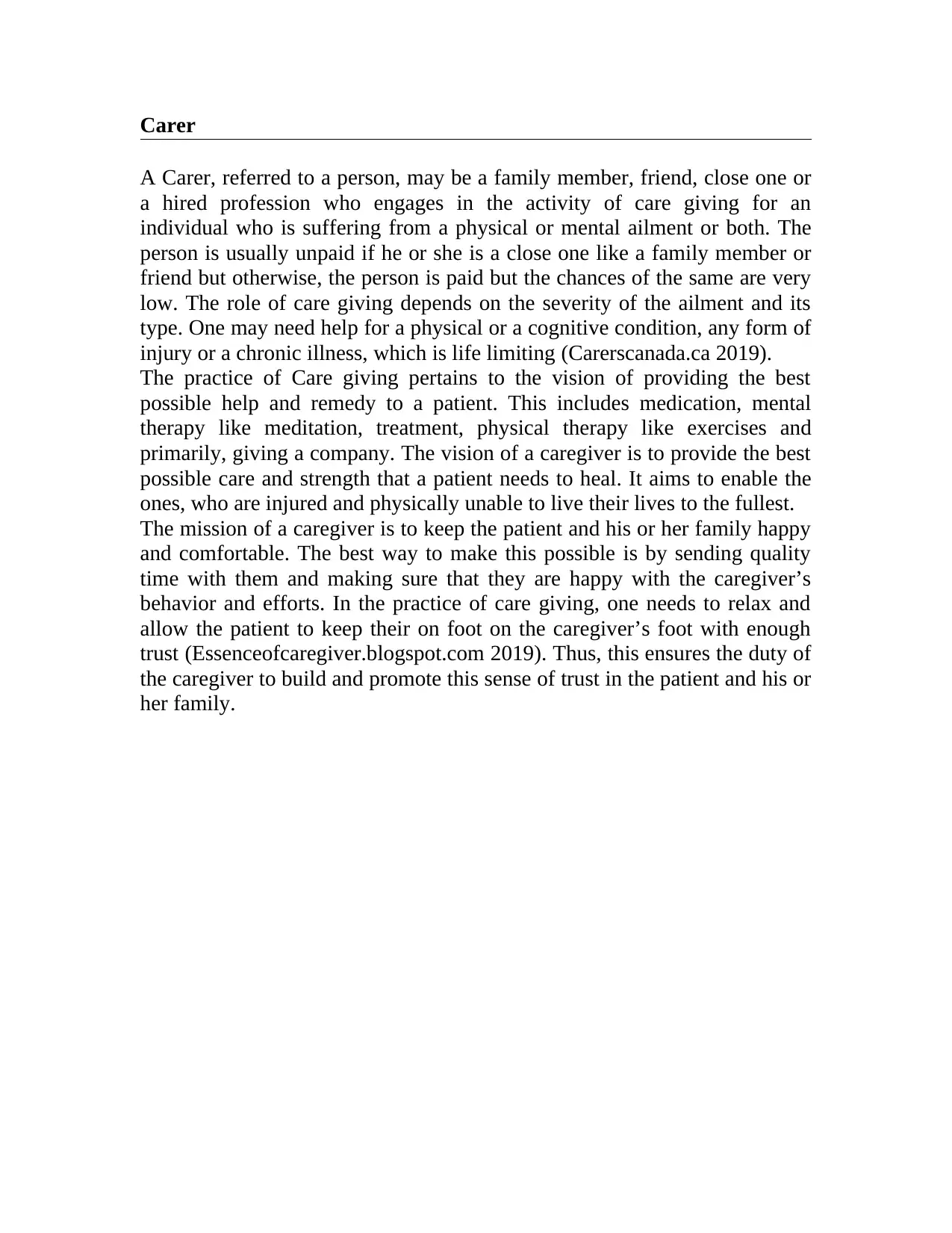
Carer
A Carer, referred to a person, may be a family member, friend, close one or
a hired profession who engages in the activity of care giving for an
individual who is suffering from a physical or mental ailment or both. The
person is usually unpaid if he or she is a close one like a family member or
friend but otherwise, the person is paid but the chances of the same are very
low. The role of care giving depends on the severity of the ailment and its
type. One may need help for a physical or a cognitive condition, any form of
injury or a chronic illness, which is life limiting (Carerscanada.ca 2019).
The practice of Care giving pertains to the vision of providing the best
possible help and remedy to a patient. This includes medication, mental
therapy like meditation, treatment, physical therapy like exercises and
primarily, giving a company. The vision of a caregiver is to provide the best
possible care and strength that a patient needs to heal. It aims to enable the
ones, who are injured and physically unable to live their lives to the fullest.
The mission of a caregiver is to keep the patient and his or her family happy
and comfortable. The best way to make this possible is by sending quality
time with them and making sure that they are happy with the caregiver’s
behavior and efforts. In the practice of care giving, one needs to relax and
allow the patient to keep their on foot on the caregiver’s foot with enough
trust (Essenceofcaregiver.blogspot.com 2019). Thus, this ensures the duty of
the caregiver to build and promote this sense of trust in the patient and his or
her family.
A Carer, referred to a person, may be a family member, friend, close one or
a hired profession who engages in the activity of care giving for an
individual who is suffering from a physical or mental ailment or both. The
person is usually unpaid if he or she is a close one like a family member or
friend but otherwise, the person is paid but the chances of the same are very
low. The role of care giving depends on the severity of the ailment and its
type. One may need help for a physical or a cognitive condition, any form of
injury or a chronic illness, which is life limiting (Carerscanada.ca 2019).
The practice of Care giving pertains to the vision of providing the best
possible help and remedy to a patient. This includes medication, mental
therapy like meditation, treatment, physical therapy like exercises and
primarily, giving a company. The vision of a caregiver is to provide the best
possible care and strength that a patient needs to heal. It aims to enable the
ones, who are injured and physically unable to live their lives to the fullest.
The mission of a caregiver is to keep the patient and his or her family happy
and comfortable. The best way to make this possible is by sending quality
time with them and making sure that they are happy with the caregiver’s
behavior and efforts. In the practice of care giving, one needs to relax and
allow the patient to keep their on foot on the caregiver’s foot with enough
trust (Essenceofcaregiver.blogspot.com 2019). Thus, this ensures the duty of
the caregiver to build and promote this sense of trust in the patient and his or
her family.
Secure Best Marks with AI Grader
Need help grading? Try our AI Grader for instant feedback on your assignments.
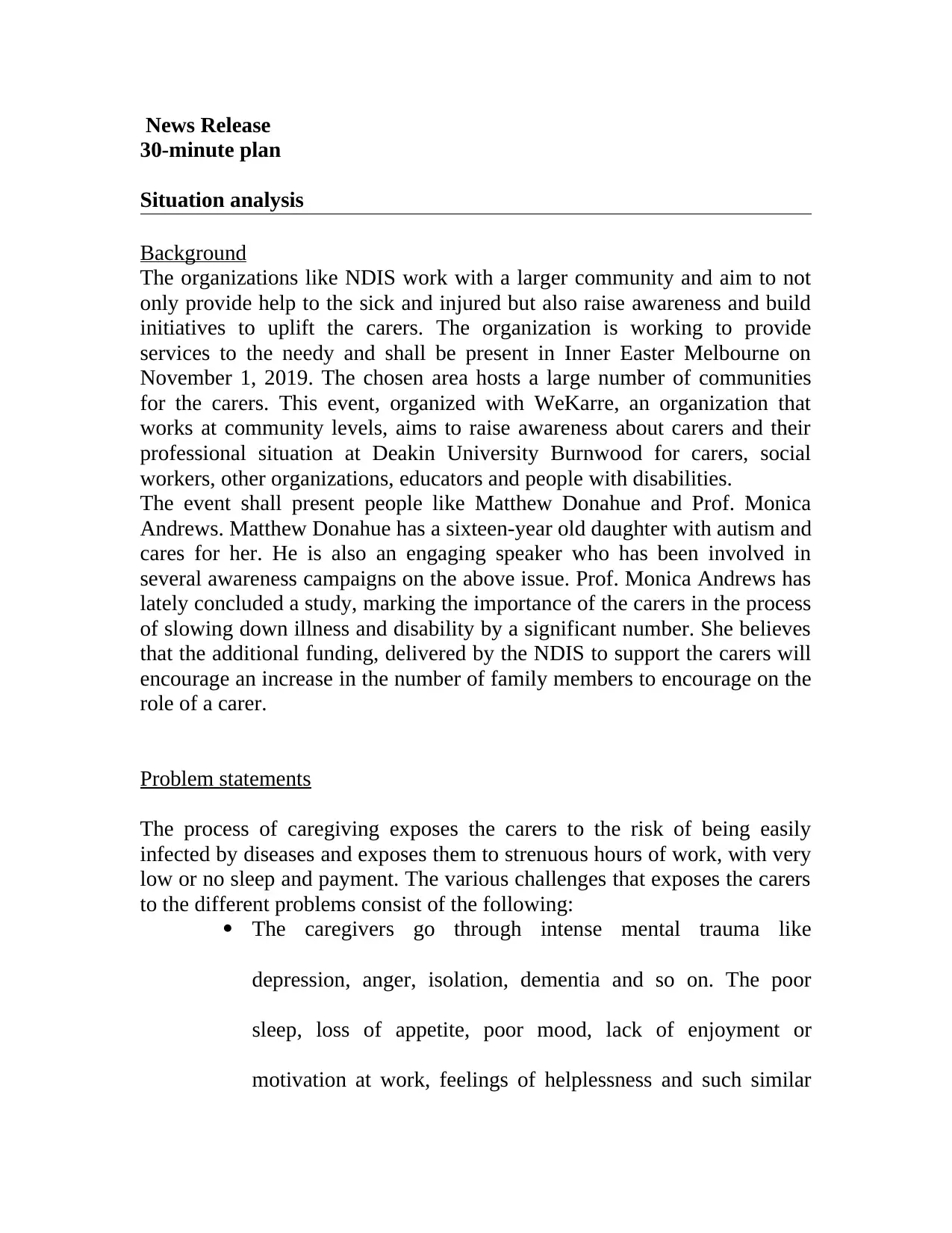
News Release
30-minute plan
Situation analysis
Background
The organizations like NDIS work with a larger community and aim to not
only provide help to the sick and injured but also raise awareness and build
initiatives to uplift the carers. The organization is working to provide
services to the needy and shall be present in Inner Easter Melbourne on
November 1, 2019. The chosen area hosts a large number of communities
for the carers. This event, organized with WeKarre, an organization that
works at community levels, aims to raise awareness about carers and their
professional situation at Deakin University Burnwood for carers, social
workers, other organizations, educators and people with disabilities.
The event shall present people like Matthew Donahue and Prof. Monica
Andrews. Matthew Donahue has a sixteen-year old daughter with autism and
cares for her. He is also an engaging speaker who has been involved in
several awareness campaigns on the above issue. Prof. Monica Andrews has
lately concluded a study, marking the importance of the carers in the process
of slowing down illness and disability by a significant number. She believes
that the additional funding, delivered by the NDIS to support the carers will
encourage an increase in the number of family members to encourage on the
role of a carer.
Problem statements
The process of caregiving exposes the carers to the risk of being easily
infected by diseases and exposes them to strenuous hours of work, with very
low or no sleep and payment. The various challenges that exposes the carers
to the different problems consist of the following:
The caregivers go through intense mental trauma like
depression, anger, isolation, dementia and so on. The poor
sleep, loss of appetite, poor mood, lack of enjoyment or
motivation at work, feelings of helplessness and such similar
30-minute plan
Situation analysis
Background
The organizations like NDIS work with a larger community and aim to not
only provide help to the sick and injured but also raise awareness and build
initiatives to uplift the carers. The organization is working to provide
services to the needy and shall be present in Inner Easter Melbourne on
November 1, 2019. The chosen area hosts a large number of communities
for the carers. This event, organized with WeKarre, an organization that
works at community levels, aims to raise awareness about carers and their
professional situation at Deakin University Burnwood for carers, social
workers, other organizations, educators and people with disabilities.
The event shall present people like Matthew Donahue and Prof. Monica
Andrews. Matthew Donahue has a sixteen-year old daughter with autism and
cares for her. He is also an engaging speaker who has been involved in
several awareness campaigns on the above issue. Prof. Monica Andrews has
lately concluded a study, marking the importance of the carers in the process
of slowing down illness and disability by a significant number. She believes
that the additional funding, delivered by the NDIS to support the carers will
encourage an increase in the number of family members to encourage on the
role of a carer.
Problem statements
The process of caregiving exposes the carers to the risk of being easily
infected by diseases and exposes them to strenuous hours of work, with very
low or no sleep and payment. The various challenges that exposes the carers
to the different problems consist of the following:
The caregivers go through intense mental trauma like
depression, anger, isolation, dementia and so on. The poor
sleep, loss of appetite, poor mood, lack of enjoyment or
motivation at work, feelings of helplessness and such similar
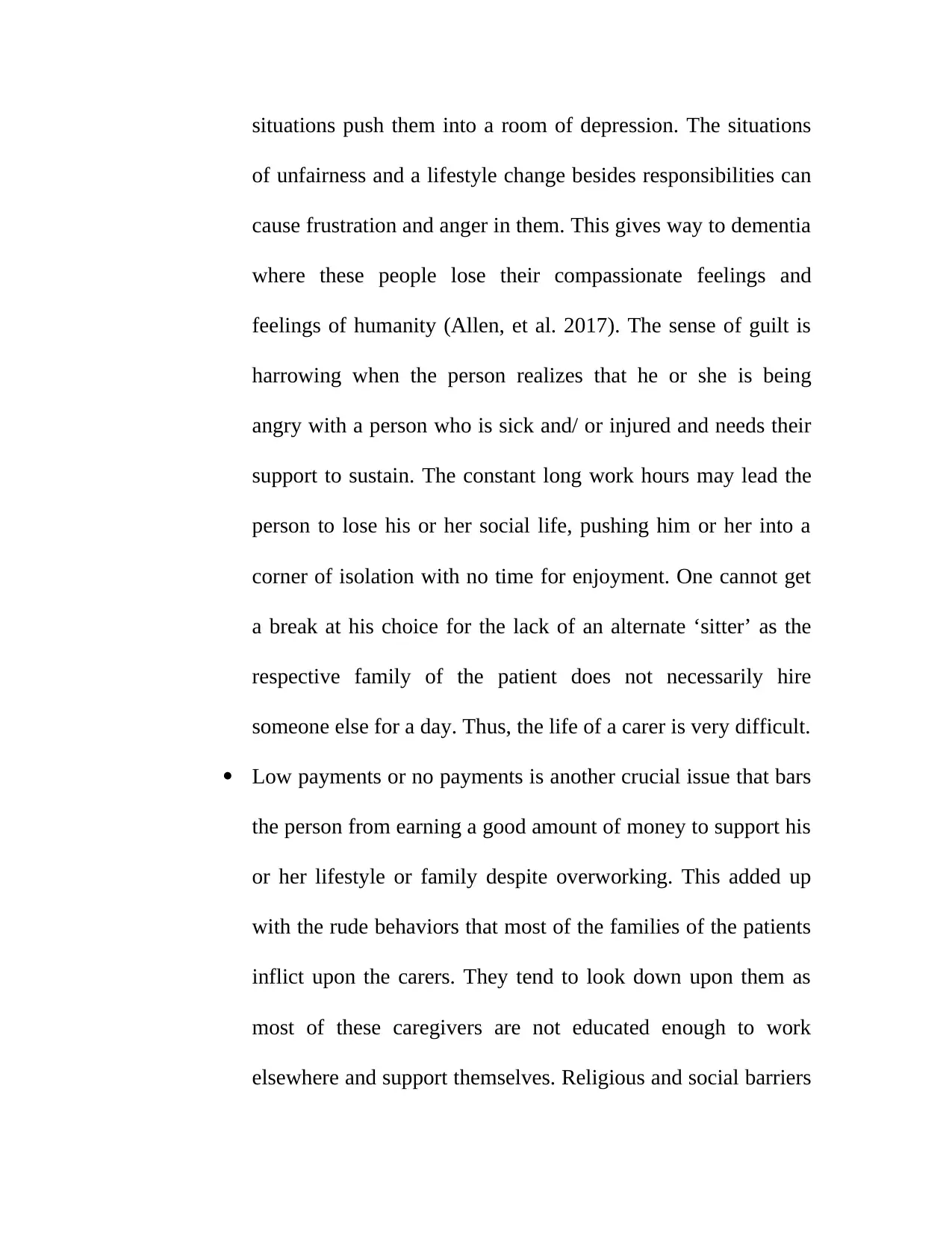
situations push them into a room of depression. The situations
of unfairness and a lifestyle change besides responsibilities can
cause frustration and anger in them. This gives way to dementia
where these people lose their compassionate feelings and
feelings of humanity (Allen, et al. 2017). The sense of guilt is
harrowing when the person realizes that he or she is being
angry with a person who is sick and/ or injured and needs their
support to sustain. The constant long work hours may lead the
person to lose his or her social life, pushing him or her into a
corner of isolation with no time for enjoyment. One cannot get
a break at his choice for the lack of an alternate ‘sitter’ as the
respective family of the patient does not necessarily hire
someone else for a day. Thus, the life of a carer is very difficult.
Low payments or no payments is another crucial issue that bars
the person from earning a good amount of money to support his
or her lifestyle or family despite overworking. This added up
with the rude behaviors that most of the families of the patients
inflict upon the carers. They tend to look down upon them as
most of these caregivers are not educated enough to work
elsewhere and support themselves. Religious and social barriers
of unfairness and a lifestyle change besides responsibilities can
cause frustration and anger in them. This gives way to dementia
where these people lose their compassionate feelings and
feelings of humanity (Allen, et al. 2017). The sense of guilt is
harrowing when the person realizes that he or she is being
angry with a person who is sick and/ or injured and needs their
support to sustain. The constant long work hours may lead the
person to lose his or her social life, pushing him or her into a
corner of isolation with no time for enjoyment. One cannot get
a break at his choice for the lack of an alternate ‘sitter’ as the
respective family of the patient does not necessarily hire
someone else for a day. Thus, the life of a carer is very difficult.
Low payments or no payments is another crucial issue that bars
the person from earning a good amount of money to support his
or her lifestyle or family despite overworking. This added up
with the rude behaviors that most of the families of the patients
inflict upon the carers. They tend to look down upon them as
most of these caregivers are not educated enough to work
elsewhere and support themselves. Religious and social barriers
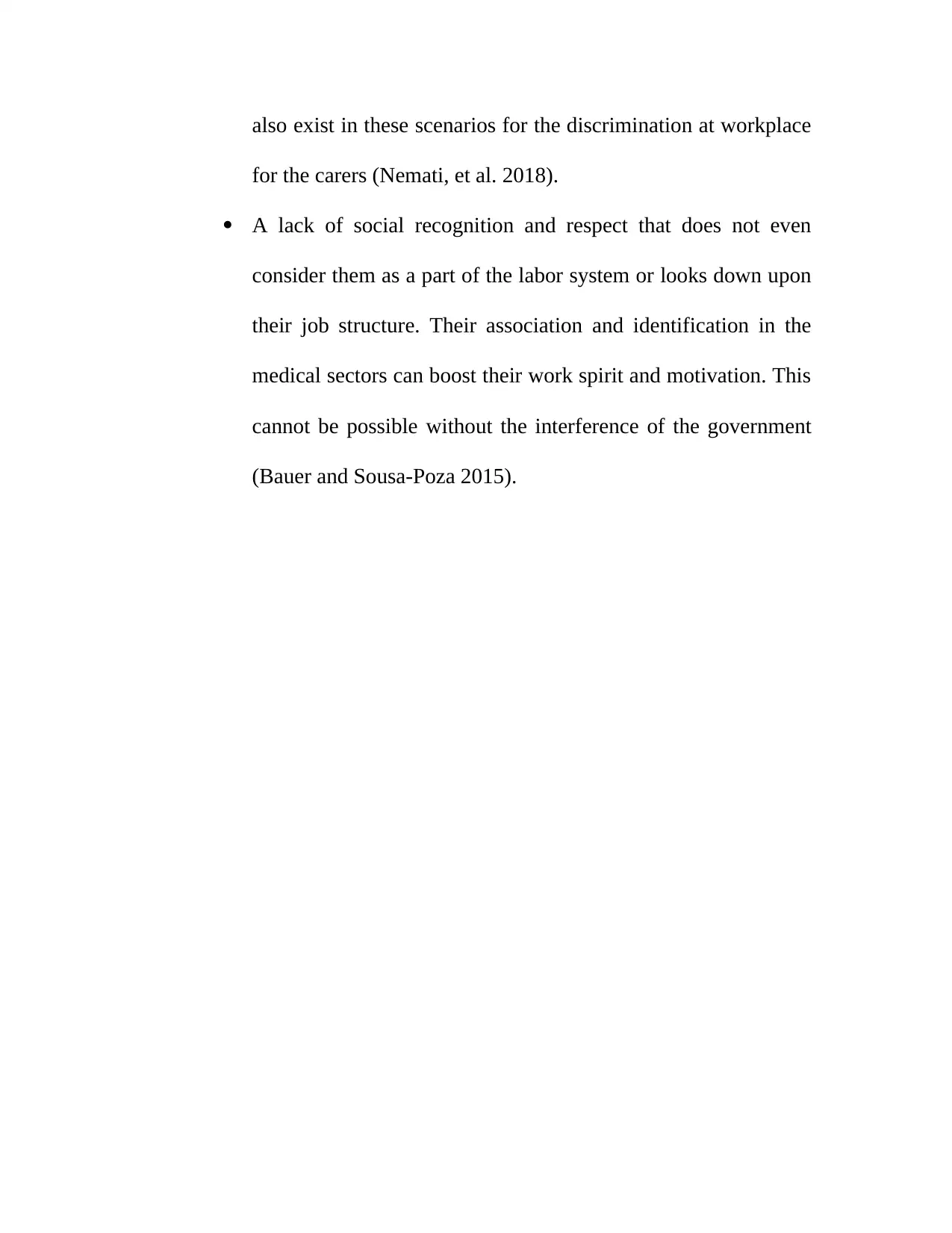
also exist in these scenarios for the discrimination at workplace
for the carers (Nemati, et al. 2018).
A lack of social recognition and respect that does not even
consider them as a part of the labor system or looks down upon
their job structure. Their association and identification in the
medical sectors can boost their work spirit and motivation. This
cannot be possible without the interference of the government
(Bauer and Sousa-Poza 2015).
for the carers (Nemati, et al. 2018).
A lack of social recognition and respect that does not even
consider them as a part of the labor system or looks down upon
their job structure. Their association and identification in the
medical sectors can boost their work spirit and motivation. This
cannot be possible without the interference of the government
(Bauer and Sousa-Poza 2015).
Secure Best Marks with AI Grader
Need help grading? Try our AI Grader for instant feedback on your assignments.
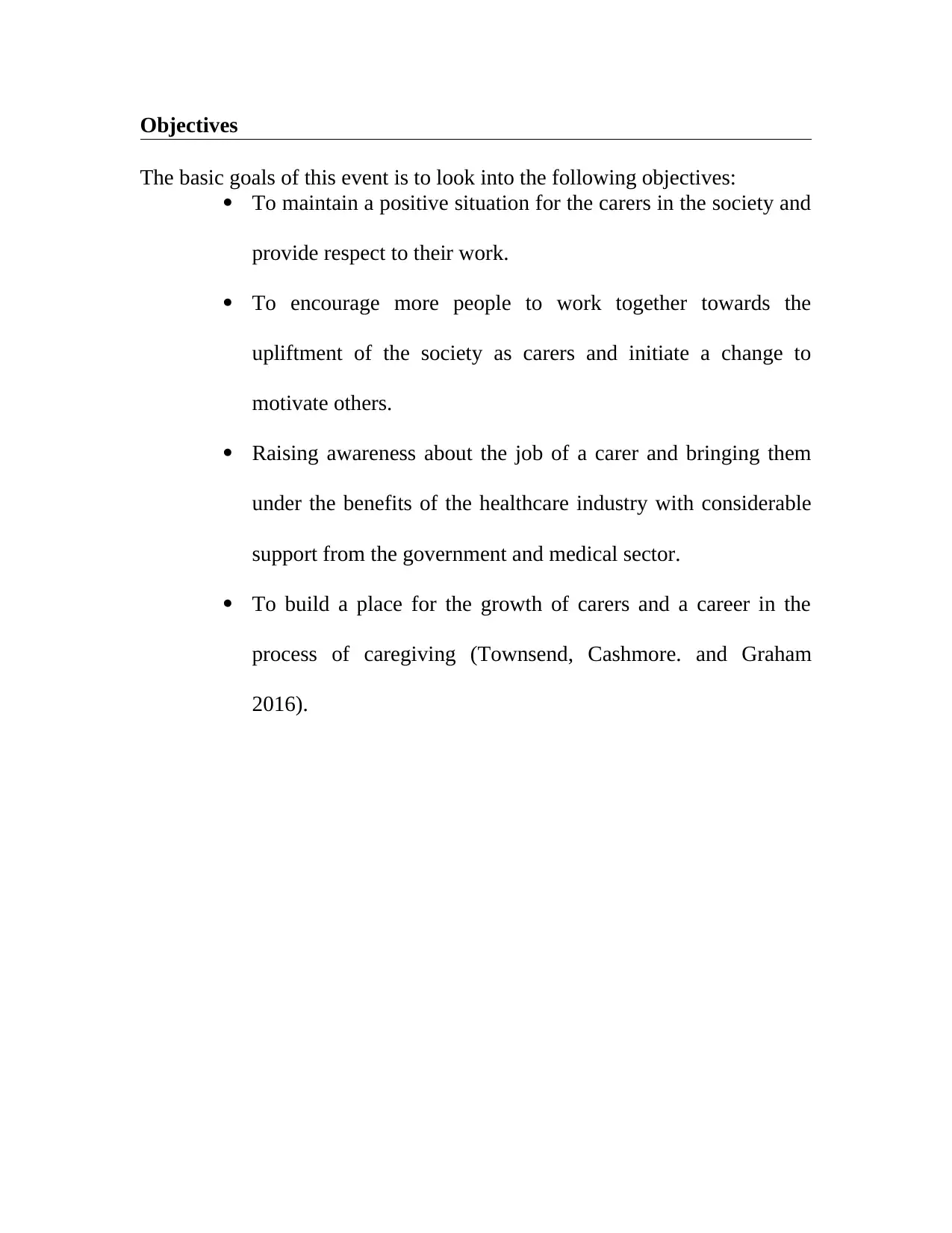
Objectives
The basic goals of this event is to look into the following objectives:
To maintain a positive situation for the carers in the society and
provide respect to their work.
To encourage more people to work together towards the
upliftment of the society as carers and initiate a change to
motivate others.
Raising awareness about the job of a carer and bringing them
under the benefits of the healthcare industry with considerable
support from the government and medical sector.
To build a place for the growth of carers and a career in the
process of caregiving (Townsend, Cashmore. and Graham
2016).
The basic goals of this event is to look into the following objectives:
To maintain a positive situation for the carers in the society and
provide respect to their work.
To encourage more people to work together towards the
upliftment of the society as carers and initiate a change to
motivate others.
Raising awareness about the job of a carer and bringing them
under the benefits of the healthcare industry with considerable
support from the government and medical sector.
To build a place for the growth of carers and a career in the
process of caregiving (Townsend, Cashmore. and Graham
2016).
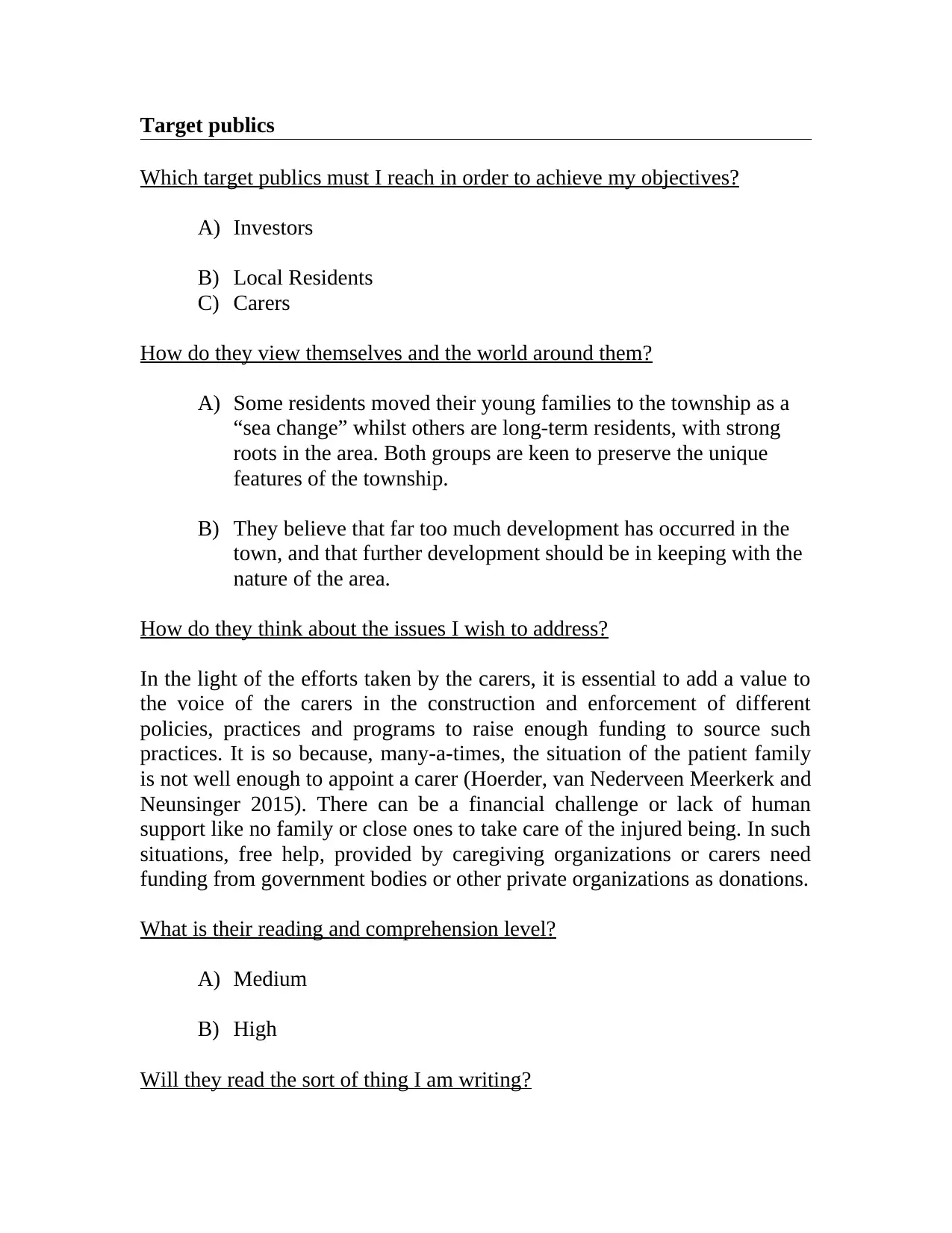
Target publics
Which target publics must I reach in order to achieve my objectives?
A) Investors
B) Local Residents
C) Carers
How do they view themselves and the world around them?
A) Some residents moved their young families to the township as a
“sea change” whilst others are long-term residents, with strong
roots in the area. Both groups are keen to preserve the unique
features of the township.
B) They believe that far too much development has occurred in the
town, and that further development should be in keeping with the
nature of the area.
How do they think about the issues I wish to address?
In the light of the efforts taken by the carers, it is essential to add a value to
the voice of the carers in the construction and enforcement of different
policies, practices and programs to raise enough funding to source such
practices. It is so because, many-a-times, the situation of the patient family
is not well enough to appoint a carer (Hoerder, van Nederveen Meerkerk and
Neunsinger 2015). There can be a financial challenge or lack of human
support like no family or close ones to take care of the injured being. In such
situations, free help, provided by caregiving organizations or carers need
funding from government bodies or other private organizations as donations.
What is their reading and comprehension level?
A) Medium
B) High
Will they read the sort of thing I am writing?
Which target publics must I reach in order to achieve my objectives?
A) Investors
B) Local Residents
C) Carers
How do they view themselves and the world around them?
A) Some residents moved their young families to the township as a
“sea change” whilst others are long-term residents, with strong
roots in the area. Both groups are keen to preserve the unique
features of the township.
B) They believe that far too much development has occurred in the
town, and that further development should be in keeping with the
nature of the area.
How do they think about the issues I wish to address?
In the light of the efforts taken by the carers, it is essential to add a value to
the voice of the carers in the construction and enforcement of different
policies, practices and programs to raise enough funding to source such
practices. It is so because, many-a-times, the situation of the patient family
is not well enough to appoint a carer (Hoerder, van Nederveen Meerkerk and
Neunsinger 2015). There can be a financial challenge or lack of human
support like no family or close ones to take care of the injured being. In such
situations, free help, provided by caregiving organizations or carers need
funding from government bodies or other private organizations as donations.
What is their reading and comprehension level?
A) Medium
B) High
Will they read the sort of thing I am writing?
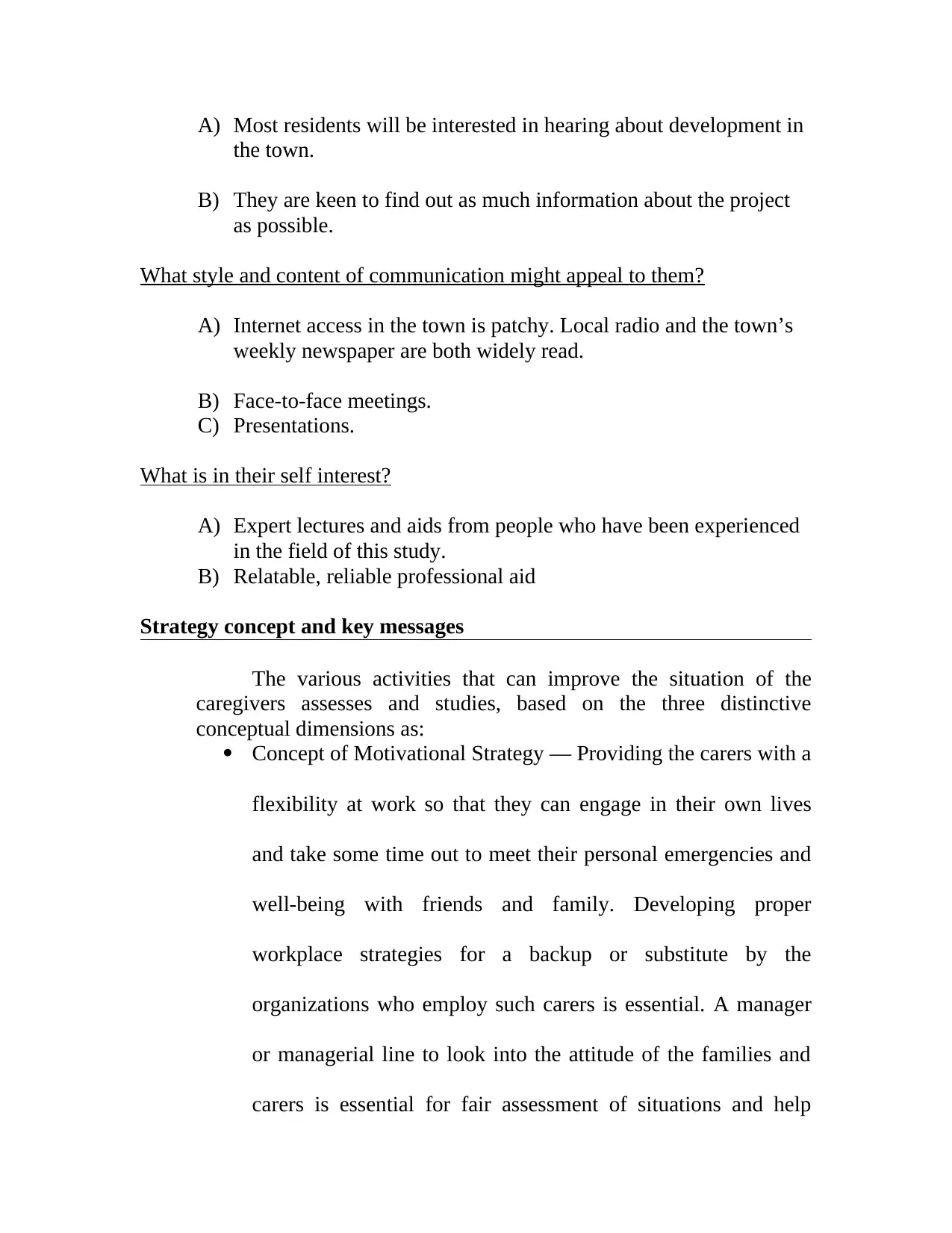
A) Most residents will be interested in hearing about development in
the town.
B) They are keen to find out as much information about the project
as possible.
What style and content of communication might appeal to them?
A) Internet access in the town is patchy. Local radio and the town’s
weekly newspaper are both widely read.
B) Face-to-face meetings.
C) Presentations.
What is in their self interest?
A) Expert lectures and aids from people who have been experienced
in the field of this study.
B) Relatable, reliable professional aid
Strategy concept and key messages
The various activities that can improve the situation of the
caregivers assesses and studies, based on the three distinctive
conceptual dimensions as:
Concept of Motivational Strategy — Providing the carers with a
flexibility at work so that they can engage in their own lives
and take some time out to meet their personal emergencies and
well-being with friends and family. Developing proper
workplace strategies for a backup or substitute by the
organizations who employ such carers is essential. A manager
or managerial line to look into the attitude of the families and
carers is essential for fair assessment of situations and help
the town.
B) They are keen to find out as much information about the project
as possible.
What style and content of communication might appeal to them?
A) Internet access in the town is patchy. Local radio and the town’s
weekly newspaper are both widely read.
B) Face-to-face meetings.
C) Presentations.
What is in their self interest?
A) Expert lectures and aids from people who have been experienced
in the field of this study.
B) Relatable, reliable professional aid
Strategy concept and key messages
The various activities that can improve the situation of the
caregivers assesses and studies, based on the three distinctive
conceptual dimensions as:
Concept of Motivational Strategy — Providing the carers with a
flexibility at work so that they can engage in their own lives
and take some time out to meet their personal emergencies and
well-being with friends and family. Developing proper
workplace strategies for a backup or substitute by the
organizations who employ such carers is essential. A manager
or managerial line to look into the attitude of the families and
carers is essential for fair assessment of situations and help
Paraphrase This Document
Need a fresh take? Get an instant paraphrase of this document with our AI Paraphraser
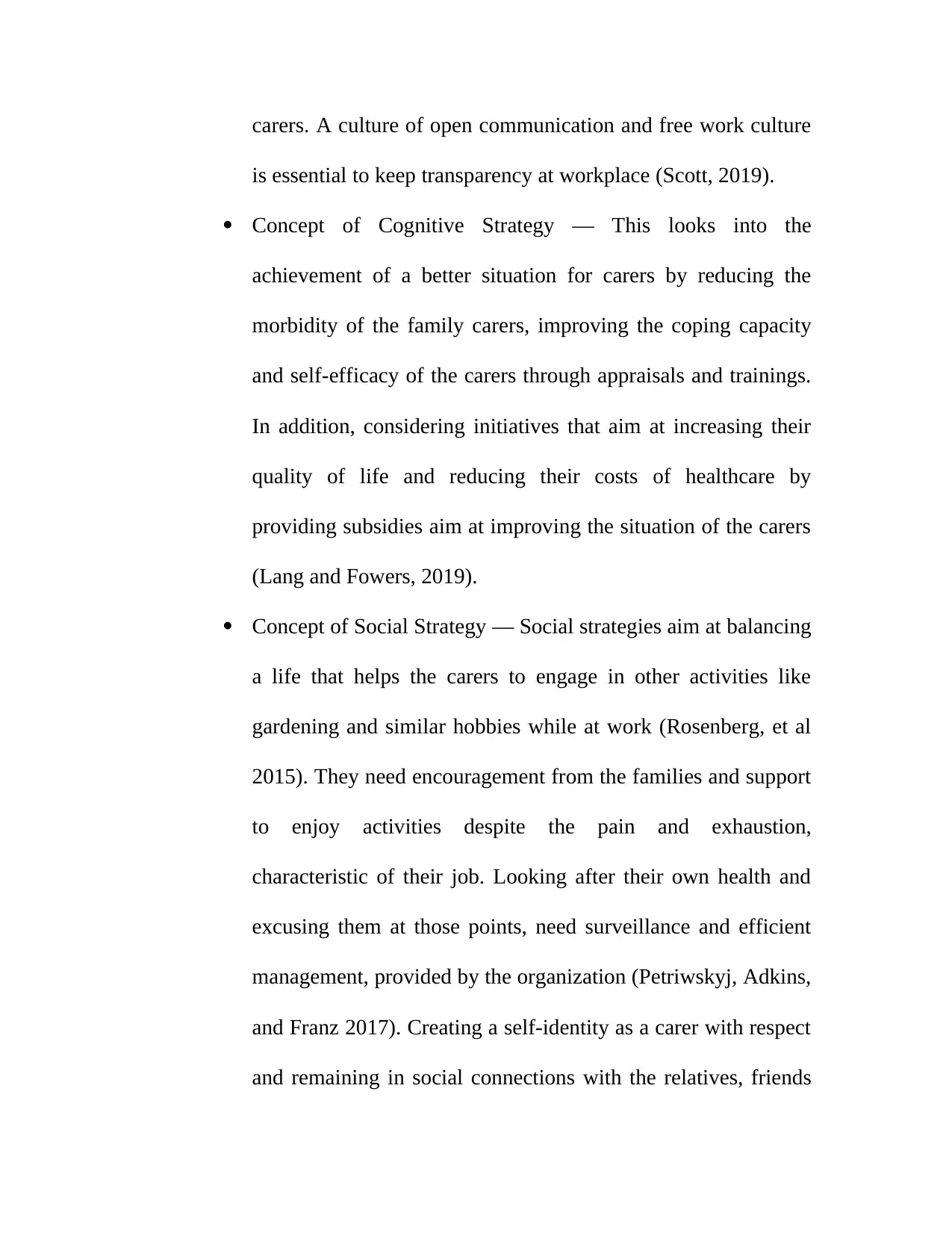
carers. A culture of open communication and free work culture
is essential to keep transparency at workplace (Scott, 2019).
Concept of Cognitive Strategy — This looks into the
achievement of a better situation for carers by reducing the
morbidity of the family carers, improving the coping capacity
and self-efficacy of the carers through appraisals and trainings.
In addition, considering initiatives that aim at increasing their
quality of life and reducing their costs of healthcare by
providing subsidies aim at improving the situation of the carers
(Lang and Fowers, 2019).
Concept of Social Strategy — Social strategies aim at balancing
a life that helps the carers to engage in other activities like
gardening and similar hobbies while at work (Rosenberg, et al
2015). They need encouragement from the families and support
to enjoy activities despite the pain and exhaustion,
characteristic of their job. Looking after their own health and
excusing them at those points, need surveillance and efficient
management, provided by the organization (Petriwskyj, Adkins,
and Franz 2017). Creating a self-identity as a carer with respect
and remaining in social connections with the relatives, friends
is essential to keep transparency at workplace (Scott, 2019).
Concept of Cognitive Strategy — This looks into the
achievement of a better situation for carers by reducing the
morbidity of the family carers, improving the coping capacity
and self-efficacy of the carers through appraisals and trainings.
In addition, considering initiatives that aim at increasing their
quality of life and reducing their costs of healthcare by
providing subsidies aim at improving the situation of the carers
(Lang and Fowers, 2019).
Concept of Social Strategy — Social strategies aim at balancing
a life that helps the carers to engage in other activities like
gardening and similar hobbies while at work (Rosenberg, et al
2015). They need encouragement from the families and support
to enjoy activities despite the pain and exhaustion,
characteristic of their job. Looking after their own health and
excusing them at those points, need surveillance and efficient
management, provided by the organization (Petriwskyj, Adkins,
and Franz 2017). Creating a self-identity as a carer with respect
and remaining in social connections with the relatives, friends
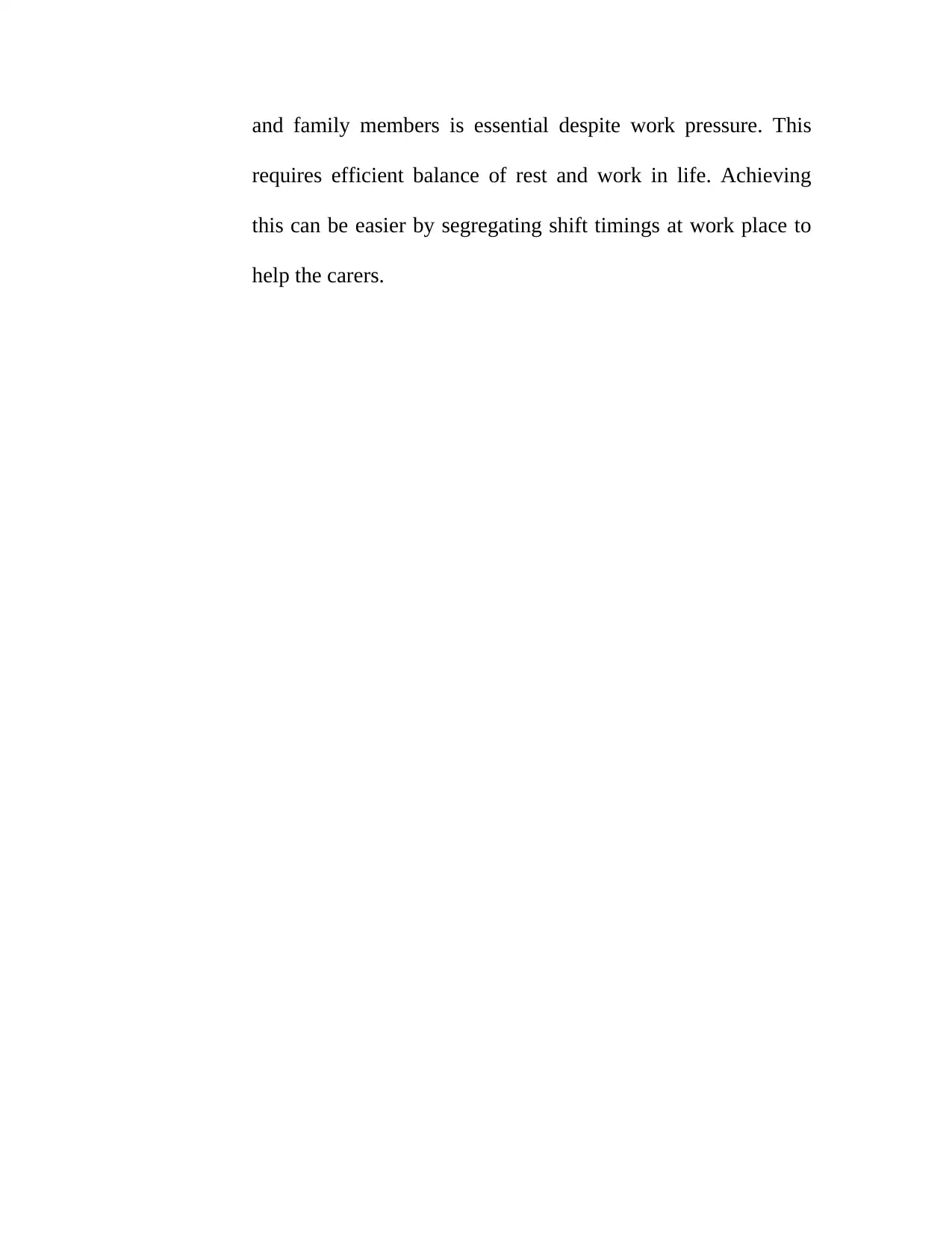
and family members is essential despite work pressure. This
requires efficient balance of rest and work in life. Achieving
this can be easier by segregating shift timings at work place to
help the carers.
requires efficient balance of rest and work in life. Achieving
this can be easier by segregating shift timings at work place to
help the carers.
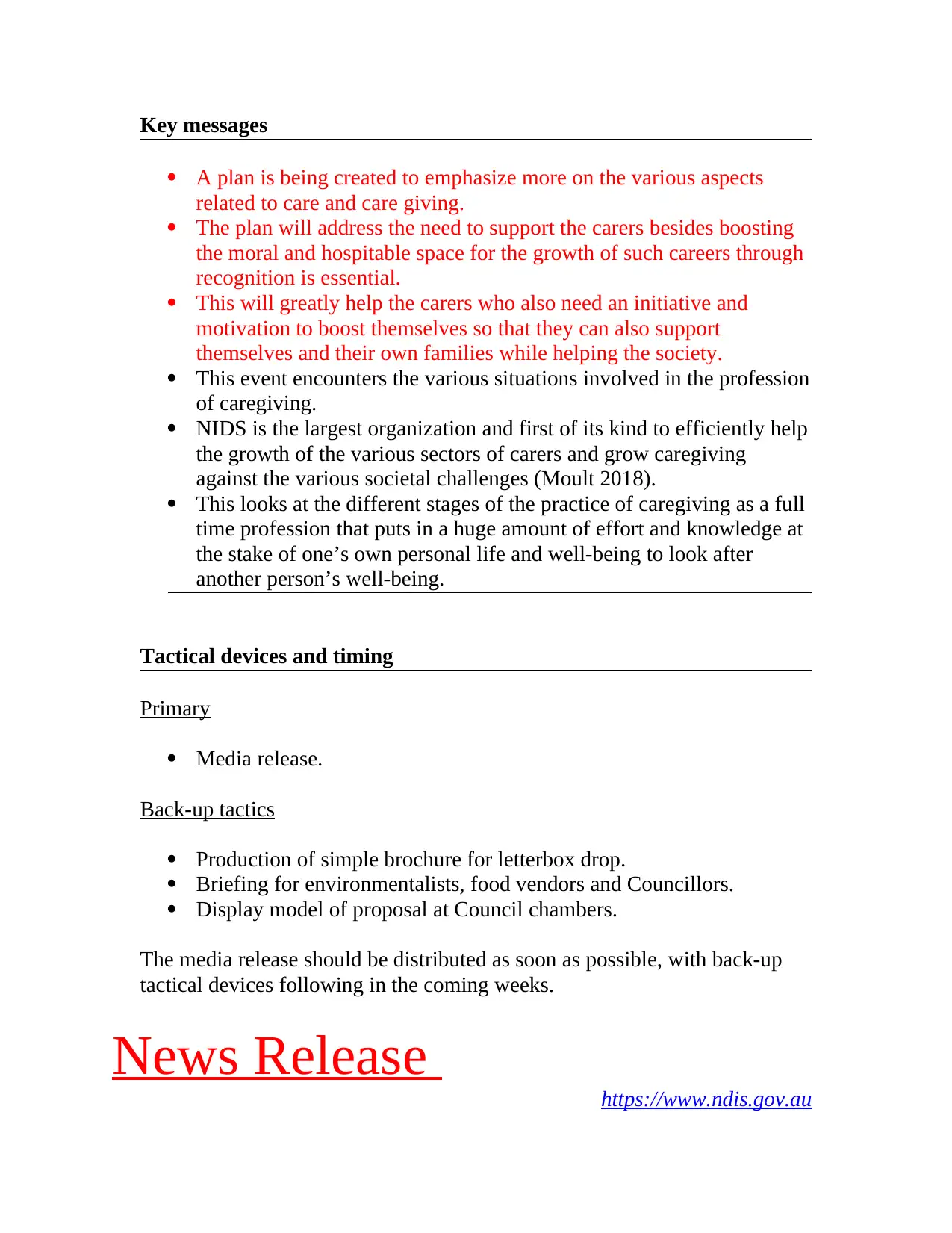
Key messages
A plan is being created to emphasize more on the various aspects
related to care and care giving.
The plan will address the need to support the carers besides boosting
the moral and hospitable space for the growth of such careers through
recognition is essential.
This will greatly help the carers who also need an initiative and
motivation to boost themselves so that they can also support
themselves and their own families while helping the society.
This event encounters the various situations involved in the profession
of caregiving.
NIDS is the largest organization and first of its kind to efficiently help
the growth of the various sectors of carers and grow caregiving
against the various societal challenges (Moult 2018).
This looks at the different stages of the practice of caregiving as a full
time profession that puts in a huge amount of effort and knowledge at
the stake of one’s own personal life and well-being to look after
another person’s well-being.
Tactical devices and timing
Primary
Media release.
Back-up tactics
Production of simple brochure for letterbox drop.
Briefing for environmentalists, food vendors and Councillors.
Display model of proposal at Council chambers.
The media release should be distributed as soon as possible, with back-up
tactical devices following in the coming weeks.
News Release https://www.ndis.gov.au
A plan is being created to emphasize more on the various aspects
related to care and care giving.
The plan will address the need to support the carers besides boosting
the moral and hospitable space for the growth of such careers through
recognition is essential.
This will greatly help the carers who also need an initiative and
motivation to boost themselves so that they can also support
themselves and their own families while helping the society.
This event encounters the various situations involved in the profession
of caregiving.
NIDS is the largest organization and first of its kind to efficiently help
the growth of the various sectors of carers and grow caregiving
against the various societal challenges (Moult 2018).
This looks at the different stages of the practice of caregiving as a full
time profession that puts in a huge amount of effort and knowledge at
the stake of one’s own personal life and well-being to look after
another person’s well-being.
Tactical devices and timing
Primary
Media release.
Back-up tactics
Production of simple brochure for letterbox drop.
Briefing for environmentalists, food vendors and Councillors.
Display model of proposal at Council chambers.
The media release should be distributed as soon as possible, with back-up
tactical devices following in the coming weeks.
News Release https://www.ndis.gov.au
Secure Best Marks with AI Grader
Need help grading? Try our AI Grader for instant feedback on your assignments.
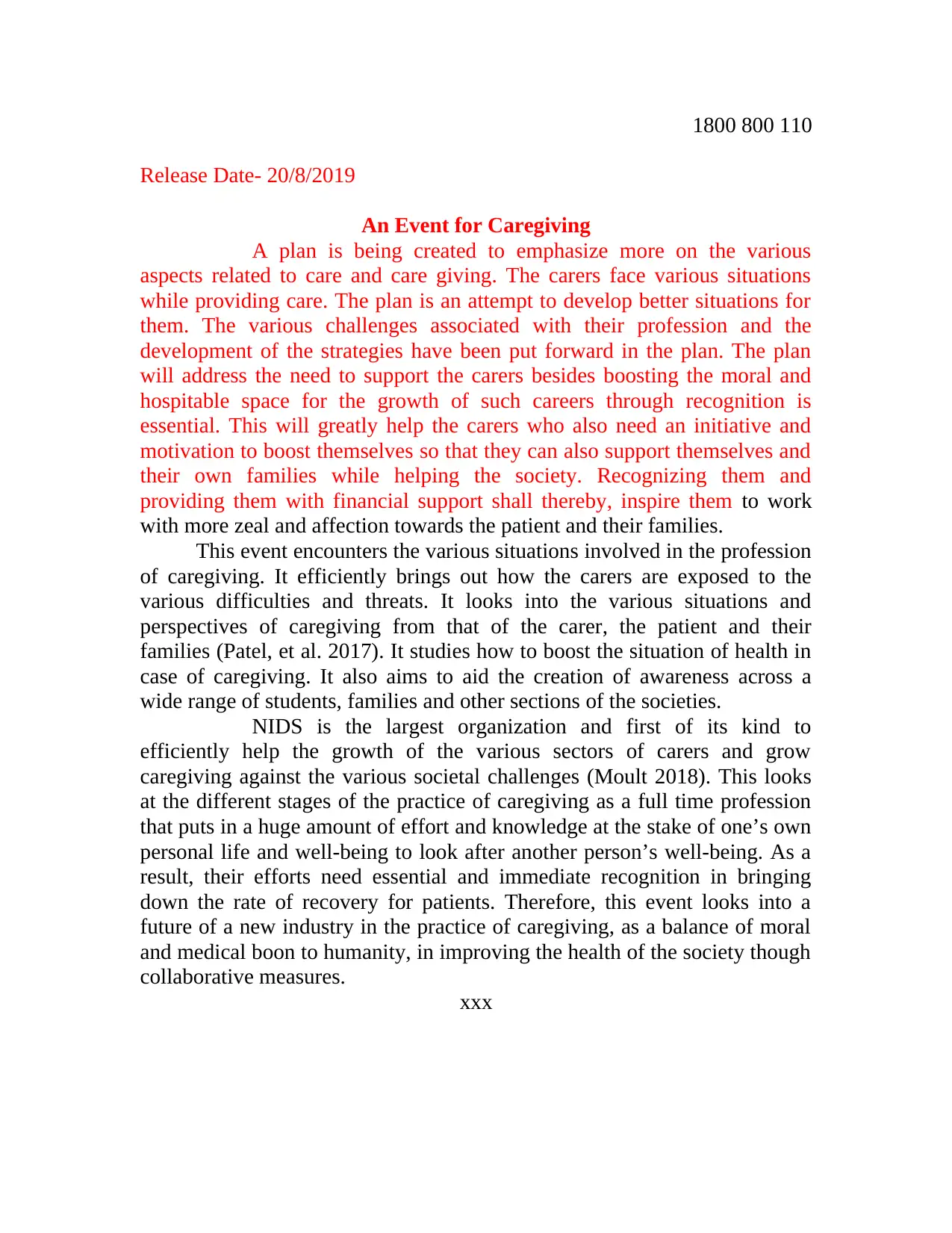
1800 800 110
Release Date- 20/8/2019
An Event for Caregiving
A plan is being created to emphasize more on the various
aspects related to care and care giving. The carers face various situations
while providing care. The plan is an attempt to develop better situations for
them. The various challenges associated with their profession and the
development of the strategies have been put forward in the plan. The plan
will address the need to support the carers besides boosting the moral and
hospitable space for the growth of such careers through recognition is
essential. This will greatly help the carers who also need an initiative and
motivation to boost themselves so that they can also support themselves and
their own families while helping the society. Recognizing them and
providing them with financial support shall thereby, inspire them to work
with more zeal and affection towards the patient and their families.
This event encounters the various situations involved in the profession
of caregiving. It efficiently brings out how the carers are exposed to the
various difficulties and threats. It looks into the various situations and
perspectives of caregiving from that of the carer, the patient and their
families (Patel, et al. 2017). It studies how to boost the situation of health in
case of caregiving. It also aims to aid the creation of awareness across a
wide range of students, families and other sections of the societies.
NIDS is the largest organization and first of its kind to
efficiently help the growth of the various sectors of carers and grow
caregiving against the various societal challenges (Moult 2018). This looks
at the different stages of the practice of caregiving as a full time profession
that puts in a huge amount of effort and knowledge at the stake of one’s own
personal life and well-being to look after another person’s well-being. As a
result, their efforts need essential and immediate recognition in bringing
down the rate of recovery for patients. Therefore, this event looks into a
future of a new industry in the practice of caregiving, as a balance of moral
and medical boon to humanity, in improving the health of the society though
collaborative measures.
xxx
Release Date- 20/8/2019
An Event for Caregiving
A plan is being created to emphasize more on the various
aspects related to care and care giving. The carers face various situations
while providing care. The plan is an attempt to develop better situations for
them. The various challenges associated with their profession and the
development of the strategies have been put forward in the plan. The plan
will address the need to support the carers besides boosting the moral and
hospitable space for the growth of such careers through recognition is
essential. This will greatly help the carers who also need an initiative and
motivation to boost themselves so that they can also support themselves and
their own families while helping the society. Recognizing them and
providing them with financial support shall thereby, inspire them to work
with more zeal and affection towards the patient and their families.
This event encounters the various situations involved in the profession
of caregiving. It efficiently brings out how the carers are exposed to the
various difficulties and threats. It looks into the various situations and
perspectives of caregiving from that of the carer, the patient and their
families (Patel, et al. 2017). It studies how to boost the situation of health in
case of caregiving. It also aims to aid the creation of awareness across a
wide range of students, families and other sections of the societies.
NIDS is the largest organization and first of its kind to
efficiently help the growth of the various sectors of carers and grow
caregiving against the various societal challenges (Moult 2018). This looks
at the different stages of the practice of caregiving as a full time profession
that puts in a huge amount of effort and knowledge at the stake of one’s own
personal life and well-being to look after another person’s well-being. As a
result, their efforts need essential and immediate recognition in bringing
down the rate of recovery for patients. Therefore, this event looks into a
future of a new industry in the practice of caregiving, as a balance of moral
and medical boon to humanity, in improving the health of the society though
collaborative measures.
xxx
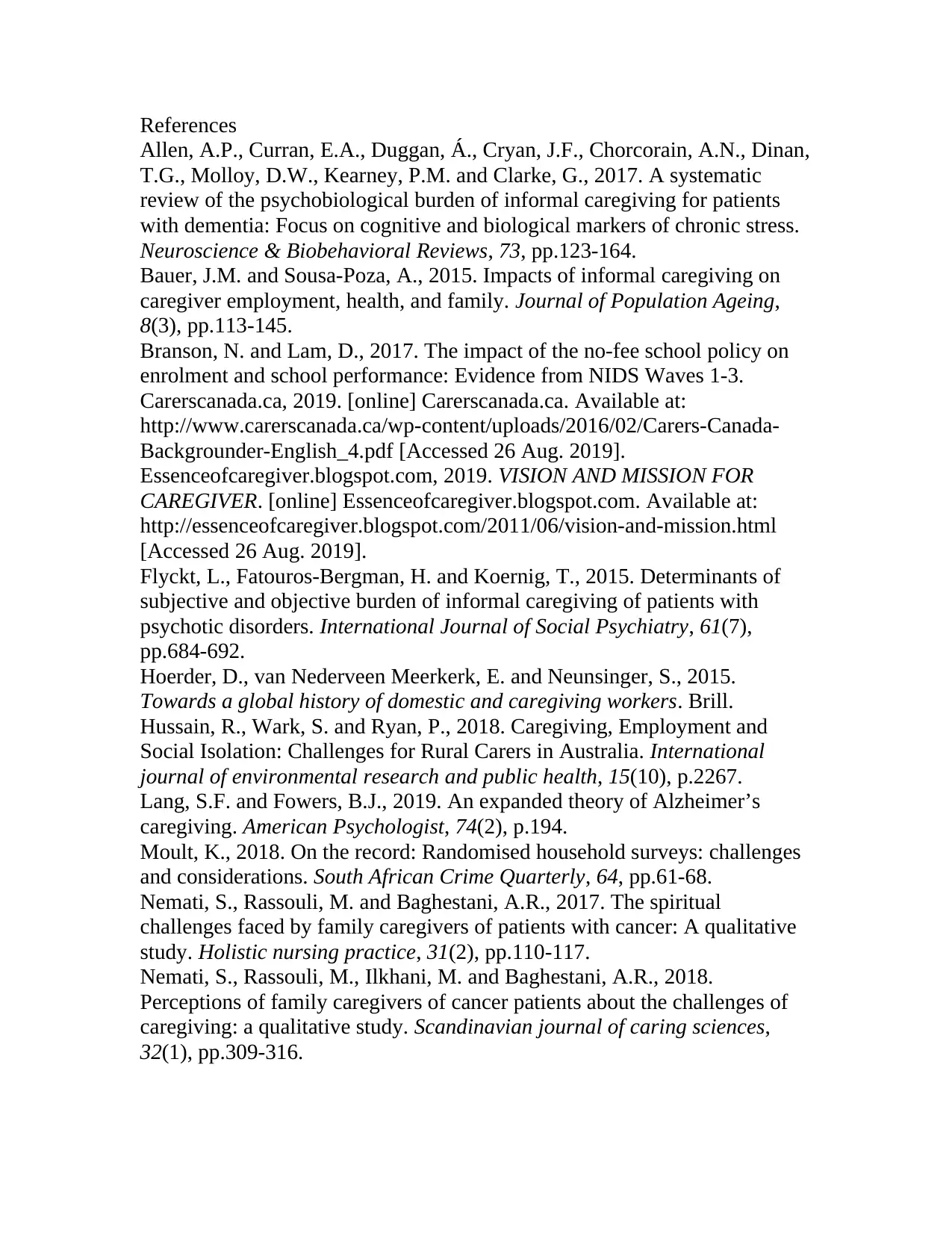
References
Allen, A.P., Curran, E.A., Duggan, Á., Cryan, J.F., Chorcorain, A.N., Dinan,
T.G., Molloy, D.W., Kearney, P.M. and Clarke, G., 2017. A systematic
review of the psychobiological burden of informal caregiving for patients
with dementia: Focus on cognitive and biological markers of chronic stress.
Neuroscience & Biobehavioral Reviews, 73, pp.123-164.
Bauer, J.M. and Sousa-Poza, A., 2015. Impacts of informal caregiving on
caregiver employment, health, and family. Journal of Population Ageing,
8(3), pp.113-145.
Branson, N. and Lam, D., 2017. The impact of the no-fee school policy on
enrolment and school performance: Evidence from NIDS Waves 1-3.
Carerscanada.ca, 2019. [online] Carerscanada.ca. Available at:
http://www.carerscanada.ca/wp-content/uploads/2016/02/Carers-Canada-
Backgrounder-English_4.pdf [Accessed 26 Aug. 2019].
Essenceofcaregiver.blogspot.com, 2019. VISION AND MISSION FOR
CAREGIVER. [online] Essenceofcaregiver.blogspot.com. Available at:
http://essenceofcaregiver.blogspot.com/2011/06/vision-and-mission.html
[Accessed 26 Aug. 2019].
Flyckt, L., Fatouros-Bergman, H. and Koernig, T., 2015. Determinants of
subjective and objective burden of informal caregiving of patients with
psychotic disorders. International Journal of Social Psychiatry, 61(7),
pp.684-692.
Hoerder, D., van Nederveen Meerkerk, E. and Neunsinger, S., 2015.
Towards a global history of domestic and caregiving workers. Brill.
Hussain, R., Wark, S. and Ryan, P., 2018. Caregiving, Employment and
Social Isolation: Challenges for Rural Carers in Australia. International
journal of environmental research and public health, 15(10), p.2267.
Lang, S.F. and Fowers, B.J., 2019. An expanded theory of Alzheimer’s
caregiving. American Psychologist, 74(2), p.194.
Moult, K., 2018. On the record: Randomised household surveys: challenges
and considerations. South African Crime Quarterly, 64, pp.61-68.
Nemati, S., Rassouli, M. and Baghestani, A.R., 2017. The spiritual
challenges faced by family caregivers of patients with cancer: A qualitative
study. Holistic nursing practice, 31(2), pp.110-117.
Nemati, S., Rassouli, M., Ilkhani, M. and Baghestani, A.R., 2018.
Perceptions of family caregivers of cancer patients about the challenges of
caregiving: a qualitative study. Scandinavian journal of caring sciences,
32(1), pp.309-316.
Allen, A.P., Curran, E.A., Duggan, Á., Cryan, J.F., Chorcorain, A.N., Dinan,
T.G., Molloy, D.W., Kearney, P.M. and Clarke, G., 2017. A systematic
review of the psychobiological burden of informal caregiving for patients
with dementia: Focus on cognitive and biological markers of chronic stress.
Neuroscience & Biobehavioral Reviews, 73, pp.123-164.
Bauer, J.M. and Sousa-Poza, A., 2015. Impacts of informal caregiving on
caregiver employment, health, and family. Journal of Population Ageing,
8(3), pp.113-145.
Branson, N. and Lam, D., 2017. The impact of the no-fee school policy on
enrolment and school performance: Evidence from NIDS Waves 1-3.
Carerscanada.ca, 2019. [online] Carerscanada.ca. Available at:
http://www.carerscanada.ca/wp-content/uploads/2016/02/Carers-Canada-
Backgrounder-English_4.pdf [Accessed 26 Aug. 2019].
Essenceofcaregiver.blogspot.com, 2019. VISION AND MISSION FOR
CAREGIVER. [online] Essenceofcaregiver.blogspot.com. Available at:
http://essenceofcaregiver.blogspot.com/2011/06/vision-and-mission.html
[Accessed 26 Aug. 2019].
Flyckt, L., Fatouros-Bergman, H. and Koernig, T., 2015. Determinants of
subjective and objective burden of informal caregiving of patients with
psychotic disorders. International Journal of Social Psychiatry, 61(7),
pp.684-692.
Hoerder, D., van Nederveen Meerkerk, E. and Neunsinger, S., 2015.
Towards a global history of domestic and caregiving workers. Brill.
Hussain, R., Wark, S. and Ryan, P., 2018. Caregiving, Employment and
Social Isolation: Challenges for Rural Carers in Australia. International
journal of environmental research and public health, 15(10), p.2267.
Lang, S.F. and Fowers, B.J., 2019. An expanded theory of Alzheimer’s
caregiving. American Psychologist, 74(2), p.194.
Moult, K., 2018. On the record: Randomised household surveys: challenges
and considerations. South African Crime Quarterly, 64, pp.61-68.
Nemati, S., Rassouli, M. and Baghestani, A.R., 2017. The spiritual
challenges faced by family caregivers of patients with cancer: A qualitative
study. Holistic nursing practice, 31(2), pp.110-117.
Nemati, S., Rassouli, M., Ilkhani, M. and Baghestani, A.R., 2018.
Perceptions of family caregivers of cancer patients about the challenges of
caregiving: a qualitative study. Scandinavian journal of caring sciences,
32(1), pp.309-316.
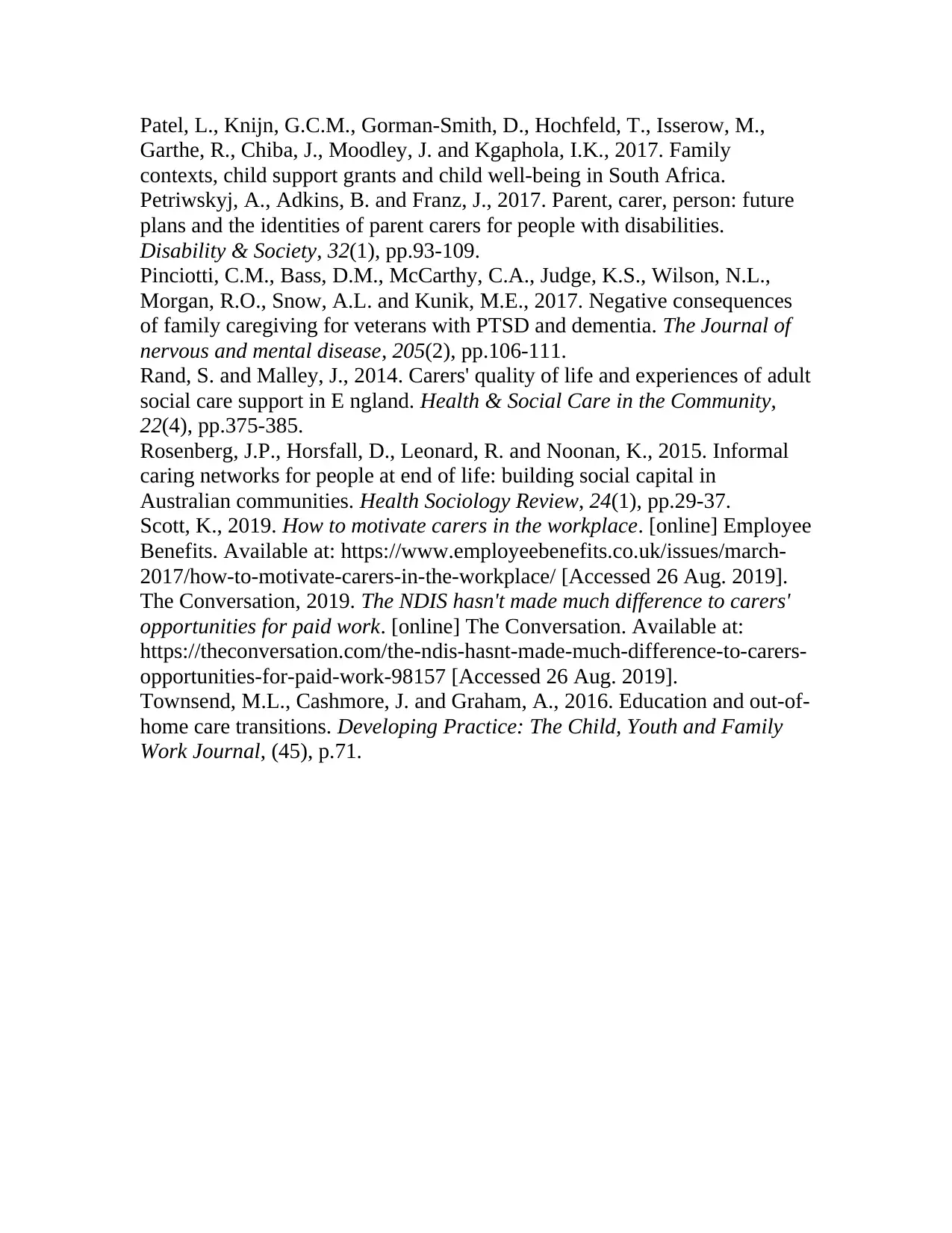
Patel, L., Knijn, G.C.M., Gorman-Smith, D., Hochfeld, T., Isserow, M.,
Garthe, R., Chiba, J., Moodley, J. and Kgaphola, I.K., 2017. Family
contexts, child support grants and child well-being in South Africa.
Petriwskyj, A., Adkins, B. and Franz, J., 2017. Parent, carer, person: future
plans and the identities of parent carers for people with disabilities.
Disability & Society, 32(1), pp.93-109.
Pinciotti, C.M., Bass, D.M., McCarthy, C.A., Judge, K.S., Wilson, N.L.,
Morgan, R.O., Snow, A.L. and Kunik, M.E., 2017. Negative consequences
of family caregiving for veterans with PTSD and dementia. The Journal of
nervous and mental disease, 205(2), pp.106-111.
Rand, S. and Malley, J., 2014. Carers' quality of life and experiences of adult
social care support in E ngland. Health & Social Care in the Community,
22(4), pp.375-385.
Rosenberg, J.P., Horsfall, D., Leonard, R. and Noonan, K., 2015. Informal
caring networks for people at end of life: building social capital in
Australian communities. Health Sociology Review, 24(1), pp.29-37.
Scott, K., 2019. How to motivate carers in the workplace. [online] Employee
Benefits. Available at: https://www.employeebenefits.co.uk/issues/march-
2017/how-to-motivate-carers-in-the-workplace/ [Accessed 26 Aug. 2019].
The Conversation, 2019. The NDIS hasn't made much difference to carers'
opportunities for paid work. [online] The Conversation. Available at:
https://theconversation.com/the-ndis-hasnt-made-much-difference-to-carers-
opportunities-for-paid-work-98157 [Accessed 26 Aug. 2019].
Townsend, M.L., Cashmore, J. and Graham, A., 2016. Education and out-of-
home care transitions. Developing Practice: The Child, Youth and Family
Work Journal, (45), p.71.
Garthe, R., Chiba, J., Moodley, J. and Kgaphola, I.K., 2017. Family
contexts, child support grants and child well-being in South Africa.
Petriwskyj, A., Adkins, B. and Franz, J., 2017. Parent, carer, person: future
plans and the identities of parent carers for people with disabilities.
Disability & Society, 32(1), pp.93-109.
Pinciotti, C.M., Bass, D.M., McCarthy, C.A., Judge, K.S., Wilson, N.L.,
Morgan, R.O., Snow, A.L. and Kunik, M.E., 2017. Negative consequences
of family caregiving for veterans with PTSD and dementia. The Journal of
nervous and mental disease, 205(2), pp.106-111.
Rand, S. and Malley, J., 2014. Carers' quality of life and experiences of adult
social care support in E ngland. Health & Social Care in the Community,
22(4), pp.375-385.
Rosenberg, J.P., Horsfall, D., Leonard, R. and Noonan, K., 2015. Informal
caring networks for people at end of life: building social capital in
Australian communities. Health Sociology Review, 24(1), pp.29-37.
Scott, K., 2019. How to motivate carers in the workplace. [online] Employee
Benefits. Available at: https://www.employeebenefits.co.uk/issues/march-
2017/how-to-motivate-carers-in-the-workplace/ [Accessed 26 Aug. 2019].
The Conversation, 2019. The NDIS hasn't made much difference to carers'
opportunities for paid work. [online] The Conversation. Available at:
https://theconversation.com/the-ndis-hasnt-made-much-difference-to-carers-
opportunities-for-paid-work-98157 [Accessed 26 Aug. 2019].
Townsend, M.L., Cashmore, J. and Graham, A., 2016. Education and out-of-
home care transitions. Developing Practice: The Child, Youth and Family
Work Journal, (45), p.71.
1 out of 13
Your All-in-One AI-Powered Toolkit for Academic Success.
+13062052269
info@desklib.com
Available 24*7 on WhatsApp / Email
![[object Object]](/_next/static/media/star-bottom.7253800d.svg)
Unlock your academic potential
© 2024 | Zucol Services PVT LTD | All rights reserved.